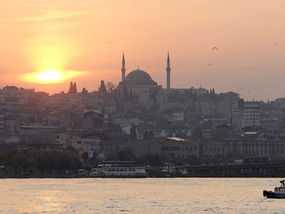President Abdullah Gül has said he hoped Turkey’s economic progress would take it into the ranks of emerging BRIC countries — Brazil, Russia, India and China — although he made it clear Turkey remains committed to joining the European Union.
Gül, in an interview with the Financial Times, said the international order was shifting towards the East. “It wouldn’t be surprising if we start talking about BRIC plus T,” he said. The BRIC countries are considered to be at a similar stage of newly advanced economic development, and their growing influence in the global scene is seen as an indication of the shift in economic power from the developed West towards the developing world.
Turkey, which has built closer ties with its Middle East neighbors under the Justice and Development Party (AK Party) government, has been accused in the West of turning away from the Western club and cozying up to countries such as Iran.
Gül, who was on a visit to Britain to receive the prestigious Chatham House Prize, said in the interview that Turkey still saw membership in the EU as a “strategic vision” and wanted to be part of the principles that Europe defends, promising that Ankara would make sure it met all standards required for membership even though large parts of its entry negotiations are frozen.
But Gül, speaking a day before the European Commission criticized Turkey for restrictions on freedom of expression and over Cyprus in an annual progress report released on Tuesday, also complained of political obstacles raised by some EU member countries. “We see certain political issues being included in the process, which have the effect of slowing down and, to a certain extent, hijacking these negotiations. We are not happy about this,” Gül told the Financial Times on Monday.
Speaking in Oxford also on Monday, Gül said some EU member states were creating “artificial problems” in Turkey’s EU membership negotiations but said Turkey would stick to the task. “The injection of some political issues of certain member countries in the negotiating process leads to certain artificial problems that in our point of view are not fair and not acceptable,” he said at an event hosted by the Oxford Centre for Islamic Studies. “But Turkey is determined to move forward in the direction of working on the negotiations,” he said.
Gül declined to name any country when he complained that certain, unnamed, “short-sighted” EU countries had hidden behind the Greek Cypriots to pursue their own objective of delaying Turkey’s membership bid in interviews with the British media. But Turkish officials say some EU countries, such as France, are using the impasse over Cyprus to stall Turkey’s accession bid.
He also said one cannot say for sure that Turkey will eventually join the EU because there will be public votes in several EU countries on Turkish membership after conclusion of accession talks with Turkey. “When the time comes, those countries will decide whether or not Turkey would be a burden on them. Maybe Turkish people would say, ‘although we concluded the negotiation process successfully, let us not be a member’,” Gül told the BBC’s “HARDtalk.”
Responding to a question on Turkey’s position regarding a planned NATO-wide missile defense system, Gül was hopeful that the alliance’s upcoming summit in Lisbon will produce a consensus on the issue. “The NATO Summit will convene in Lisbon next week. I think everybody will reach a consensus in the end,” he said.
Turkey insists that no country should be named as a potential threat in relevant NATO documents, a reference to Turkey’s neighbor, Iran.
When it was pointed out that US President Barack Obama addressed Muslim countries and relayed messages about peace and dialogue when he first came to power and he was asked whether Obama has caused disappointment since then, Gül said: “No, I think he is kindhearted. He does good things sincerely. However, maybe he could not succeed. Not only Muslims but others should listen to Obama. He should also persuade others, not just one party, to achieve peace in the region.”
via Today’s Zaman, your gateway to Turkish daily news.



